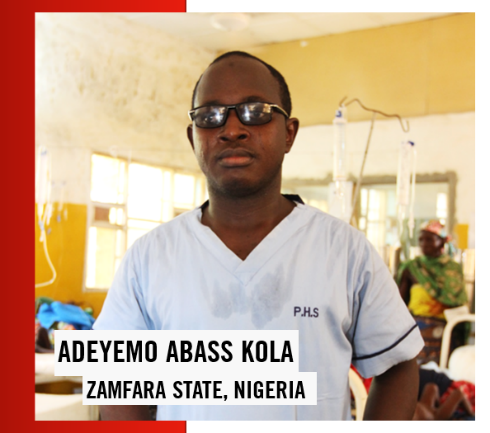Adeyemo Abass Kola is a winner of the International Neonatal Nursing Excellence Award 2016, for his work for newborns in Nigeria’s Zamfara state. As a nurse in a Doctors without Borders hospital, Kola treats newborns suffering from lead poisoning, birth asphyxia, hypothermia, malnutrition, and infections. Despite the challenges, Kola is determined to continue to do whatever it takes to save newborn lives.
What are some of the biggest challenges you face, working as a neonatal nurse, in an emergency setting?
There are so many challenges ranging from lack of treatment and having to cut out some practices we should be doing to lack of cooperation from mothers and people in the community. The biggest challenge I see though is the lack of resources. For example, sometimes a baby will be brought in to the hospital and does not even have clothes and you have to try to make the baby warm even though there are no tools to do that.
Despite the challenges of being a neonatal nurse, what drives you to continue your work each day?
The first thing I keep in mind as a nurse in an emergency setting is the spirit of being a humanitarian –you want to deliver care at all costs, against all odds. What really makes me want to do my work more is when I see the babies who are innocent and the mothers are not well educated. When you see these mothers and newborns and you just have to help and when you finally see a baby recover you are quite happy and these memories give you joy. These memories make you want to come back and help others, no matter what.
Tell us about one of the most memorable moments as a neonatal nurse in your hospital.
There was this child, a premature baby named Aisiah, born only weighing 0.8kg (1.76 lbs) with a blood lead level five times the normal level. When she was born she was convulsing already and her mother had given up but we cared for the baby and she stayed in our ward for two months. This baby suffered so many things in addition to lead poisoning, like struggling to breathe, hypothermia and high fevers, but she survived and is now three years old. What makes me remember this child is that, no matter what, this baby always fought to live.
What are your hopes for the future?
My hope for the future is that one day I will become a certified neonatal intensive care nurse so that I will be able to provide the best care to newborns. To me, these children are innocent and bringing them to the world requires a lot of support, time and dedication.
In light of winning this award, what would you like to say to other neonatal nurses?
What is most important is they should keep on doing good work and try as much as possible to be dedicated to the neonates because caring for them requires a lot of dedication. They should aspire to learn more and do more research for neonates so that the neonates at large will have every chance of living.
